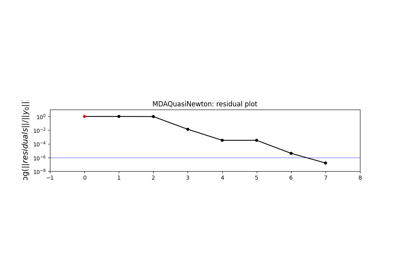quasi_newton module¶
A set of quasi Newton algorithm variants for solving MDAs.
- class gemseo.mda.quasi_newton.MDAQuasiNewton(disciplines, max_mda_iter=10, name=None, grammar_type=GrammarType.JSON, method='hybr', use_gradient=False, tolerance=1e-06, linear_solver_tolerance=1e-12, warm_start=False, use_lu_fact=False, coupling_structure=None, linear_solver='DEFAULT', linear_solver_options=None)[source]
Bases:
BaseMDARootQuasi-Newton solver for MDA.
Quasi-Newton methods include numerous variants ( Broyden, Levenberg-Marquardt <https://en.wikipedia.org/wiki/Levenberg-Marquardt_algorithm> __, …).
The name of the variant should be provided via the
methodparameter of the class.The new iterate is given by:
\[\begin{split}x_{k+1} = x_k - \\rho_k B_k f(x_k)\end{split}\]where \(\\rho_k\) is a coefficient chosen in order to minimize the convergence and \(B_k\) is an approximation of \(Df(x_k)^{-1}\), the inverse of the Jacobian of \(f\) at \(x_k\).
Initialize self. See help(type(self)) for accurate signature.
- Parameters:
disciplines (Sequence[MDODiscipline]) – The disciplines from which to compute the MDA.
max_mda_iter (int) –
The maximum iterations number for the MDA algorithm.
By default it is set to 10.
name (str | None) – The name to be given to the MDA. If
None, use the name of the class.grammar_type (MDODiscipline.GrammarType) –
The type of the input and output grammars.
By default it is set to “JSONGrammar”.
method (str) –
The name of the method in scipy root finding, among
QUASI_NEWTON_METHODS.By default it is set to “hybr”.
use_gradient (bool) –
Whether to use the analytic gradient of the discipline.
By default it is set to False.
tolerance (float) –
The tolerance of the iterative direct coupling solver; the norm of the current residuals divided by initial residuals norm shall be lower than the tolerance to stop iterating.
By default it is set to 1e-06.
linear_solver_tolerance (float) –
The tolerance of the linear solver in the adjoint equation.
By default it is set to 1e-12.
warm_start (bool) –
Whether the second iteration and ongoing start from the previous coupling solution.
By default it is set to False.
use_lu_fact (bool) –
Whether to store a LU factorization of the matrix when using adjoint/forward differentiation. to solve faster multiple RHS problem.
By default it is set to False.
coupling_structure (MDOCouplingStructure | None) – The coupling structure to be used by the MDA. If
None, it is created from disciplines.linear_solver (str) –
The name of the linear solver.
By default it is set to “DEFAULT”.
linear_solver_options (Mapping[str, Any] | None) – The options passed to the linear solver factory.
- Raises:
ValueError – If the method is not a valid quasi-Newton method.
- ANDERSON = 'anderson'
- BROYDEN1 = 'broyden1'
- BROYDEN2 = 'broyden2'
- DF_SANE = 'df-sane'
- DIAG_BROYDEN = 'diagbroyden'
- EXCITING_MIXING = 'excitingmixing'
- HYBRID = 'hybr'
- KRYLOV = 'krylov'
- LEVENBERG_MARQUARDT = 'lm'
- LINEAR_MIXING = 'linearmixing'
- QUASI_NEWTON_METHODS: ClassVar[list[str]] = ['hybr', 'lm', 'broyden1', 'broyden2', 'anderson', 'linearmixing', 'diagbroyden', 'excitingmixing', 'krylov', 'df-sane']
- assembly: JacobianAssembly
- cache: AbstractCache | None
The cache containing one or several executions of the discipline according to the cache policy.
- coupling_structure: MDOCouplingStructure
The coupling structure to be used by the MDA.
- data_processor: DataProcessor
A tool to pre- and post-process discipline data.
- exec_for_lin: bool
Whether the last execution was due to a linearization.
- input_grammar: BaseGrammar
The input grammar.
- jac: MutableMapping[str, MutableMapping[str, ndarray | csr_array | JacobianOperator]]
The Jacobians of the outputs wrt inputs.
The structure is
{output: {input: matrix}}.
- lin_cache_tol_fact: float
The tolerance factor to cache the Jacobian.
- linear_solver: str
The name of the linear solver.
- linear_solver_options: Mapping[str, Any]
The options of the linear solver.
- linear_solver_tolerance: float
The tolerance of the linear solver in the adjoint equation.
- matrix_type: JacobianAssembly.JacobianType
The type of the matrix.
- n_processes: int
The maximum number of simultaneous threads, if
use_threadingis True, or processes otherwise, used to parallelize the execution.
- name: str
The name of the discipline.
- normed_residual: float
The normed residual.
- output_grammar: BaseGrammar
The output grammar.
- re_exec_policy: ReExecutionPolicy
The policy to re-execute the same discipline.
- reset_history_each_run: bool
Whether to reset the history of MDA residuals before each run.
- residual_variables: dict[str, str]
The output variables mapping to their inputs, to be considered as residuals; they shall be equal to zero.
- run_solves_residuals: bool
Whether the run method shall solve the residuals.
- scaling: ResidualScaling
The scaling method applied to MDA residuals for convergence monitoring.
- tolerance: float
The tolerance of the iterative direct coupling solver.
- use_lu_fact: bool
Whether to store a LU factorization of the matrix.
- use_threading: bool
Whether to use threads instead of processes to parallelize the execution.
- warm_start: bool
Whether the second iteration and ongoing start from the previous solution.

